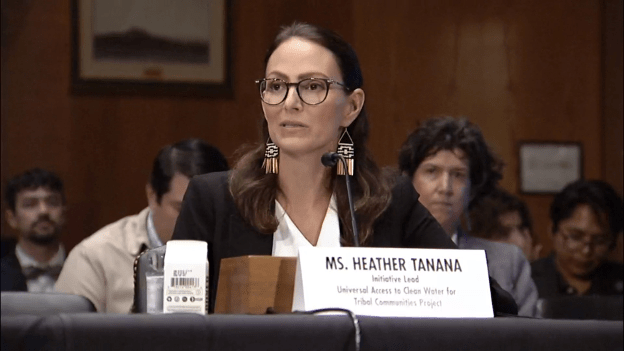 Yesterday the Senate Committee on Indian Affairs held an oversight hearing on tribal access to water—a neglected issue that is increasingly recognized but still unaddressed. During the hearing, “Water as a Trust Resource: Examining Access in Native Communities,” neither the witnesses nor the Senators minced words as to the severity of the issue.
Yesterday the Senate Committee on Indian Affairs held an oversight hearing on tribal access to water—a neglected issue that is increasingly recognized but still unaddressed. During the hearing, “Water as a Trust Resource: Examining Access in Native Communities,” neither the witnesses nor the Senators minced words as to the severity of the issue.
The chairman, Senator Schatz (D. HI), began the hearing, announcing, “Access to clean reliable water is essential for the health and well-being of all people in the United States…Native households are 19 times more likely than non-native households to lack indoor access to plumbing.”
Vice Chairman Senator Murkowski (R. AK) was more blunt.
“For most of us in this country, filing up our glass with tap water or washing our hands is pretty common place, but. . .that is not the case for far too many of our native communities.”
In Alaska, roughly 20% of native homes lack an adequate supply of fresh water or a connection to a sewer system. Diverging from her notes, Murkowski got personal.
“I’ve been to many of these communities,” Murkowski said, describing communities that rely on “washeterias,” communal places where people go to do laundry, shower, and use a toilet.
But these facilities are often in disrepair. Often the washing machines are broken, the showers are marginally functional. One community’s washeteria has been closed for an entire year. She challenged the audience to think about what that means for sanitation and basic human functions.
“Instead of flushable systems, in many houses they have a honeybucket. And a honeybucket is no more sophisticated than a Home Depot bucket that’s sitting in a corner. Sometimes there’s a screen around it. For most in this room, you can’t imagine what it means to collect your human waste in a bucket and have somebody empty it…I tell this story because it should shock us.”
She is right. It should shock us. And we should be finding solutions.
Our alumnae, Heather Tanana, also testified forcefully.
“I wear many hats, one of those being a law professor, but I am here today as the lead of the Universal Access to Clean Water for Tribes in the Colorado River Basin (a report authored by the Water & Tribes Initiative),” Tanana said. “While I have training in public health and the law, I didn’t need to go to school to learn about the inequities experienced in Indian Country. I have personally witnessed it, since I was born on the Navajo Nation.”
She told a compelling story.
“My father grew up in a home without water service. Two of his brothers fought as Navajo Code Talkers during WWII. Remarkably, for some of the Code Talkers, training was the only time in their life when they had running water…Today we recognize and honor the service of Navajo Code Talkers, and yet this country has done little to ensure that after they returned, they and their family, and future generations, would be able to survive on their federally promised homeland here in the United States [by having access to water].”
Tanana then turned to the moment at hand, noting that the Universal Access to Clean Water report had led to an increasing awareness of the challenges facing tribes who lack access to water.
“It has garnered much sympathy. But sympathy alone cannot close the water gap experienced in Indian Country,” Tanana said.
She urged the federal government, particularly Congress, to take action to address these inequities and fulfill the federal trust and treaty responsibilities of the federal government.
We are proud of Professor Tanana and the work that she started as a member of the Law & Policy Team. The mission of the Law & Policy Program is to create actionable, pragmatic research on emerging issues and provide real-time influence that promotes sound decision-making and supports a just and democratic society. I’d say that Professor Tanana fulfilled that mission yesterday.
To watch the hearing, visit the Senate Committee on Indian Affairs page and skip to the 20-minute mark. Professor Tanana’s testimony begins at the 59-minute mark. You can also read her written testimony.
 Jamie Pleune is an Associate Professor of Law (Research) and a member of the Law and Policy Group in the Wallace Stegner Center.
Jamie Pleune is an Associate Professor of Law (Research) and a member of the Law and Policy Group in the Wallace Stegner Center.
